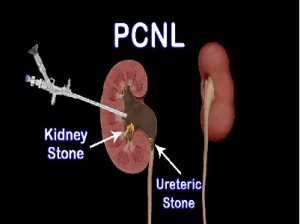What is PCNL?

What is PCNL?
PCNL is a Percutaneous Nephrolithotomy. If you have a large, multiple or complex stones. The surgery does one to three hours and typically needs a hospital stay of one to two nights. You should be ready to continue regular activities in one to two weeks.
Is PCNL dangerous?
PCNL is a reliable and efficient procedure for removing large, difficult, and many renal calculi. Still, a serious and life-threatening difficulty that can happen during or after PCNL is bleeding, which can happen during needle passage, tract dilatation, or nephrostomy.
Advantages:
- Minimal Access Surgery
- Stones of almost any size cleared
- Hardness not a criteria
- Minimal complication
- Regional Anesthesia
- A short hospital stay of 2 – 3 days
- Minimal post-op pain
- Ancilliary producers like Endopyelotomy can be done
- Even staghorn stones can be cleared by single or double punctures
- Success rate – Total stone clearance 90%
- Sandwich Therapy – PCNL + ESWL


